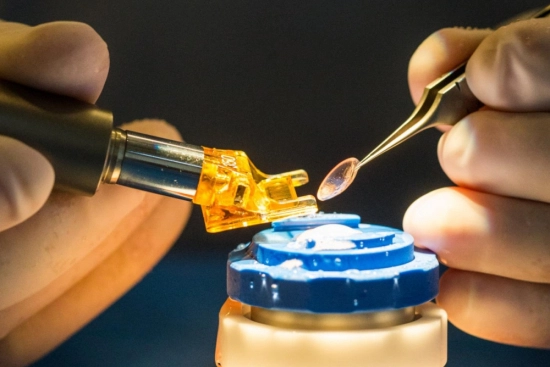The nature and severity of visual impairment varies depending on the part of the eye affected. The treatment of these pathologies represents a major challenge, not least because of the difficulty of replacing the biological tissues of the eye. In this context, cell therapy, and in particular the use of stem cells, appears to be a promising approach. By replacing defective cells with healthy cells derived from stem cells, this innovative approach aims to halt the progression of many eye diseases and, in some cases, restore vision.
In addition to their therapeutic potential, stem cells are an invaluable tool for basic research. They facilitate the understanding of pathological mechanisms, the creation of innovative cellular models and the identification of new therapeutic targets.
- Patients suffering from degenerative or traumatic eye diseases that lead to vision loss.
- Patients for whom conventional treatments are limited.
- Immune reaction.
- Infection.
- Retinal detachment.
- Increased intraocular pressure.
- Cataract.
- Formation of cancer cells.
- Gene therapy.
- Nanoparticles.
- Electrical stimulation
- It all depends on the eye problem (on the order of a few minutes).
Best Clinics with Verified Reviews

- Multispecialized hospital
- 7 operating rooms
- Capacity é of 170 beds

- Multispecialized hospital
- Hospital founded in 2007
- Very good reputation in ENT department
What is stem cell therapy?
Stem cell therapies represent a major advance in the field of medicine. These innovative treatments are designed to repair or replace cells and tissues damaged by disease or injury.
In this context, stem cells are opening up new possibilities for the treatment of eye diseases. These cells, which are capable of transforming into different cell types, are at the heart of cell therapy.
By injecting stem cells into the eye, scientists in Turkey hope to repair damaged tissue and restore lost vision. This innovative approach is particularly promising for treating diseases such as AMD, inherited retinal diseases, glaucoma and corneal diseases.
Stem cell therapy relies on the unique ability of these cells to multiply and differentiate into new, specialized cells. This property makes them a promising therapeutic tool for regenerating ocular tissues, which are often difficult to repair due to their low regenerative capacity.

Stem cells and corneal repair in Turkey
The cornea, the interface between the eye and the outside world, is exposed to micro-injuries daily. Its regeneration depends on limbal stem cells located at the edges of the cornea.
When limbal stem cells are depleted due to disease or trauma, the cornea becomes increasingly opaque and vision is compromised.
Thanks to advances in research, specialists in Turkey have developed a technique for transplanting limbal stem cells. These cells, taken from a healthy eye and grown in the laboratory, are transplanted into the damaged cornea to restore function.
For the transplant to be effective, the patient must have a healthy portion of the limbus from which the stem cells can be harvested. Unfortunately, this condition limits access to this treatment for some patients.
In Turkey, clinical trials have demonstrated the effectiveness of this approach in restoring corneal transparency and visual acuity in eligible patients.

Stem cells and retinal diseases
Cellular therapy opens new perspectives for the treatment of retinal diseases. Recent advances in the field of stem cells are encouraging, particularly in the development of effective treatments to restore vision to millions of people worldwide.
Age-related macular degeneration (AMD),retinitis pigmentosa and Leber's congenital amaurosis are eye diseases that severely affect vision. These pathologies are often associated with degradation of the retinal pigment epithelium (RPE),a layer of cells essential for proper retinal function.
RPE cell transplantation
The RPE plays a vital role in nourishing the photoreceptors, the light-sensitive cells of the retina. However, when the RPE is damaged or dysfunctional, the photoreceptors die, leading to progressive vision loss.
In an attempt to restore vision, ophthalmologists in Turkey have developed an innovative therapeutic approach: RPE cell transplantation. In the laboratory, it is now possible to generate RPE cells from embryonic or induced pluripotent stem (iPS) cells. These new cells can then be transplanted into the eye to replace damaged cells.
Clinical studies have shown that transplantation of stem cell-derived RPE cells is safe and well tolerated. The results are promising and open new perspectives for the treatment of degenerative eye diseases.
Retinal cell repair
Specialists in Turkey are not limiting themselves to RPE replacement. They are also exploring the possibility of repairing other types of retinal cells, such as Müller cells, which could serve as the body's own stem cells. This approach would make it possible to treat more advanced diseases in which not only the RPE but also the photoreceptors are damaged.
Cell therapy offers great hope for the millions of people suffering from degenerative eye diseases. By replacing damaged cells with healthy ones, it may be possible to restore some or all of the patient's vision, significantly improving their quality of life.

Challenges ahead
Although cell therapy is a promising advance for patients suffering from retinal diseases, its clinical application still faces major obstacles:
- Cell procurement: It is essential to develop efficient and safe methods to produce stem cells in large quantities and to differentiate them into specific retinal cells.
- Integration of transplanted cells: Transplanted cells must be able to properly integrate into the retina and reestablish the neuronal connections necessary for vision.
- Immune response: The immune system may reject the transplanted cells, limiting the effectiveness of the therapy.
Share this page







